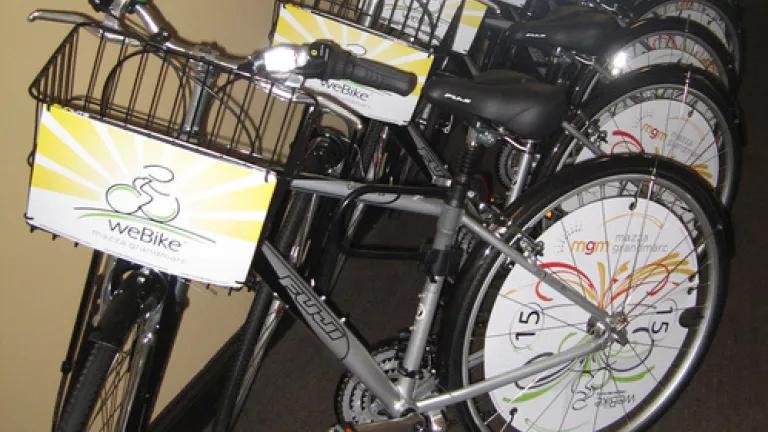
I recently served as a judge for the William James Foundation’s Socially Responsible Business Plan Competition. I’m excited to report that one of the startup companies I reviewed, WeBike, won first place in the DC regional competition on Friday.
WeBike was founded by student entrepreneurs at the University of Maryland in College Park, which is where I live. Their system is unique in that users can borrow and return bikes at existing bike racks via text message, instead of requiring costly, specialized bike-sharing stations, like the systems in Paris or London. Their strategy keeps overhead costs and potential bureaucratic hassles at a minimum.
Here’s how WeBike works: Bike locations are posted on WeBike’s website. Registered users ask for the combination of the bike they want by text message. When they’re done with the bike, they park it at any bike rack and text the location back to WeBike. The company launched a pilot program at the University of Maryland in 2009 (and was featured in a campus newscast), and already have their first client, an off-campus apartment complex located on a bike trail.
I thought their business model of targeting college campuses was pretty cool – this is a market made for bike-sharing, especially a low-cost, SMS-based system like WeBike. I’m glad to see that the other judges deemed them worthy of winning this prestigious international competition. A few other companies have stationless bike-sharing systems in the works, but WeBike is the first to actually run its program. It will be interesting to see if this becomes the model that helps bike-sharing really take off around the country.
Another interesting company I helped review for the competition was Philadelphia-based Blackgold Biofuels, which won the Foundation for a Sustainable Future's Richard Heinberg Sustainability Prize. Their technology takes fat, oil and grease from sewers – sticky stuff that really gums up the works -- and turns it into biodiesel. This is a win-win proposition, where you remove a damaging substance from wastewater and turn it into a green product.
If you’ve got a sustainable business startup, consider entering next year's competition. It’s a great way to get feedback on your business plan and help move your company to the next step. For me as a judge, it was exciting to see so many innovative, workable business ideas with the potential to reduce our dependence on oil. We need the public and private sectors on board if we want to break our oil addiction and move America into a clean energy future.